#deborah grantham
Explore tagged Tumblr posts
Text
Cards on the Table (pt. 1)
A series of post-canon vignettes, each from a different character's point of view. [Part 1/2]
A Faro’s Daughter one-shot collection. Deborah Grantham/Max Ravenscar, with a side of Phoebe Laxton/Adrian Mablethorpe.
1. Lord Mablethorpe
When informed of his cousin’s engagement to Miss Grantham, Lord Mablethorpe immediately betook himself to St James’ Square, where he spent the better part of an hour questioning Deb as to what manner of horrible things Max could have done to thus prevail upon her. In the end, it was Deborah’s extravagant blush as she declared herself very much in love with the gentleman in question that eventually set his doubts to rest. As utterly baffled at this unforeseen turn of events as he still was, at least he had the presence of mind to wish her every happiness before taking his leave, and setting out for Grosvenor Square.
To Ravenscar’s credit, he met his cousin’s stern words on the subject of Miss Grantham’s wellbeing with a good deal of amusement, and promptly assured him that nothing could be farther from his intentions than to cause any further inconvenience to his betrothed; Lord Mablethorpe privately wondered at whatever past inconveniences Max might be referring to, but in the end he was too much in awe of his cousin to probe any deeper into the subject.
He didn’t get to see much of either Max or his intended bride after that, as he was planning to fetch Phoebe from Wales and properly introduce her into society as the new Lady Mablethorpe; he was therefore quite bemused upon received a letter from Arabella, in which she informed him she had taken it upon herself to act as chaperone to the loving couple, much to her elder brother’s chagrin. Being as much acquainted with Max’s habitual aloofness as he was with the matter-of-fact way Deb dealt with her suitors, he could hardly imagine the pair engaging in anything that might be deemed even remotely inappropriate; but then again, he couldn’t have imagined anything less likely than his headstrong cousin offering for the likes of Deborah Grantham, never mind her consenting to it, so perhaps he was the one in the wrong after all.
When informed of Miss Grantham’s impending marriage, young Lady Mablethorpe declared herself utterly delighted, and expressed a wish to call on Lady Bellingham’s as soon as they were back in London; she went as far as to timidly suggest she would like nothing better than to be introduced to Lord Mablethorpe’s cousin, as he was to be married to someone she owed so much of her happiness to – along with her dearest husband, of course.
Adrian made a mental note to write to Max, detailing how he desired for his new wife to be received, and assured Phoebe that he would grant her heart’s wish, in this as in all other matters.
2. Mr Ravenscar
With considerable effort, Max Ravenscar tore himself from his betrothed’s embrace, turning his glare upon the downright annoyance that was his younger sister.
“I have told you, Belle,” he warned her, struggling for some semblance of his usual composure. “If you don’t leave this instant – ”
“But my dearest brother, I couldn’t possibly do that,” she countered, all feigned innocence and concern. At that moment, he couldn’t agree more heartily with his stepmother’s wish to have the little minx safely married and out of their care. “You see, I do remember someone lecturing me at length on how gentlemen should never be trusted with a young woman’s reputation, and I’ll have you know I take such an enlightening piece of advice very seriously.”
“Very seriously indeed,” he retorted sarcastically, taking hold of Deb’s hands to prevent her from stepping away in her embarrassment. “If this is about that wretched ball you’ve pestering me about all week, I can tell you now – ”
“That we shall be glad to escort you to it, my dear,” Deborah interjected in a rush, meeting his frown with a determined look of her own. He opened his mouth to contradict her, noticed the telltale blush colouring her cheeks, and thought better of it.
“Oh! You truly are the dearest of creatures, Miss Grantham,” the little minx exclaimed in delight. “I can scarcely wait for the moment when I shall be able to call you my sister.”
You can’t wish for that more heartily than I do, he thought to himself, even as Arabella impulsively kissed their cheek in turn, and bolted for the door. Pausing on the threshold, she turned around, the perfect picture of mischief. “I will be back in half an hour. I trust you both to behave within the bounds of propriety in the meantime.”
“I shall never be able to look her in the eye again,” Deb lamented as her sister-to-be finally took her leave, yet did nothing to resist him when he gathered her back in his arms.
“Nonsense,” Max declared, wasting no time in resuming his previous attentions. Deborah sighed, made a token protest, then willingly surrendered herself to his embrace.
3. Lord Ormskirk
If there was one thing Lord Ormskirk despised more than being worsted, it was having his fiascos bandied about; which was precisely why he took every pain to make a show of civility towards Ravenscar, regardless of how much losing the divine Deborah to such a man stung him.
After all, he reflected somewhat cynically, he could hardly measure up to a man of Ravenscar’s wealth, and fool enough to offer the lady matrimony; at least young Mablethorpe had his youthful impetuosity to excuse him, but a gentleman of Ravenscar’s age and position ought to have displayed more sense. Unfortunately, his own pride prevented him from calling Ravenscar out, as it was more than apparent that – for some reason beyond his understanding – the delightful creature’s affections were irrevocably set on his younger rival, and he cared too much about his reputation as a gentleman to attempt anything about it.
As it was, he resolved to withstand the sight of the newlywed couple flitting about the crowded ballroom with the closest approximation to a bored smile he could manage. Looking as radiant as ever, Deborah never once left Ravenscar’s side, and was conducting herself with the dignity and grace of a gentlewoman; still, as the evening unfolded, Lord Ormskirk became aware of a curious alteration to her countenance, so much that he reluctantly started to pay attention to whatever manner of things were passing between husband and wife.
Ravenscar was doing his utmost to – provoke her, there was no two ways about it. From where he was standing, he had a clear view of Ravenscar’s hand resting at the small of her back, his thumb tracing lazy patterns over the fabric of her dress. Ormskirk could hardly recall any previous occasion in which the beautiful creature had looked this flustered, and by such a simple action at that. Ah, to be young, and in love, he sighed, shook his head, and lazily strolled towards the bowl of punch.
It was much later into the evening when he clapped his eyes again on the pair; Ravenscar was distractedly sipping a glass of port when Deborah sidled up to him, leaning closer to whisper something in his ear that very nearly caused Ravenscar to choke on his wine. After that, he appeared to be making his excuses to the rest of his party, and all but dragged his wife out of the room. Deborah’s musical laugh rang out clearly as they passed him by, blind to everything except one another, and whatever his sentiments towards the gentleman, Lord Ormskirk was forced to acknowledge how Ravenscar’s infamous luck extended much farther than his horses and cards.
4. Deborah Ravenscar (née Grantham)
Deborah woke up to her husband gently shaking her shoulder, and had she not been so impossibly tired, she would have been mortified to find herself in the position of relying entirely upon him to hand her out of the carriage. She even caught Arabella casting a worried look in her direction before wishing them both a good night and retiring to her chambers.
“It would appear I am turning more and more into a frail old matron by the day,” she jested half-heartedly as he dismissed both his valet and her maid, and insisted upon helping her out of her evening gown himself. “I am exceedingly sorry you had to find out only after our marriage.”
“I would hardly have expected this sort of thing to happen before our marriage,” she heard him utter under his breath, glanced up sharply to meet the odd look he was directing at her through the mirror.
“Whatever can you mean, Max?”
She studied his reflection as he reached for the brush and started applying it to her locks. There was something peculiar about his countenance, something she couldn’t quite place, no matter how hard she strived to.
“Had either of us been blessed with sensible female relations reasonably knowledgeable about such matters, I would have suggested you to seek out their advice,” he sighed. “However, I would never ask you to submit to the indignity of broaching such a delicate issue with my stepmother, or – heaven forbid – my aunt.”
“You’re forgetting Aunt Lizzie,” she protested weakly, by now thoroughly puzzled by his oblique remarks. The truth was, she was so very tired, and his gentle ministrations had her well on her way to falling asleep where she was seated.
Max had the decency to look vaguely embarrassed at her objection. “As admirable as your aunt is, I fear she might not be as well informed upon such matters as we might wish, or she would very likely have enlightened you upon your entering the married state.”
As the meaning of his words finally dawned upon her, she was suddenly grateful for the support provided by her chair, and the pair of steadying hands around her shoulders. She was dimly aware of the clatter of the brush hitting the floor as the room spun around her in a most dizzying fashion, and the next thing she knew she was lying on the bed in their shared chamber, her concerned husband dabbing at her temples with a damp cloth.
“I am well,” she hastened to reassure him, yet she had to concede he was probably right in preventing her from sitting up. “I’m just – surprised, that’s all.”
He considered her in that intent manner he occasionally displayed in her presence. “You truly had no reason to suspect that might be the case?”
“I – I did not think too much of it, if I am honest,” she admitted, fighting the blush she felt creeping upon her cheeks. “We’ve been married for scarcely over two months, after all.”
A teasing smile danced on his face. “And we have been nothing but diligent in our marital duties, dearest.”
Her cheeks in flame, she gathered whatever little amount of energy she still possessed to swat at his arm. “Max!”
“No need to sound so scandalised, my darling wife. But I will have the family physician summoned in the morning, so that we might seek further confirmation of your condition.”
Caught between utter bewilderment and bone-deep tiredness, she made no protest when he helped her shift under the bedcovers, tucking her in as if she were little more than an infant. He pressed his lips to her brow and she let out a sigh of contentment, and was only pulled back from the brink of sleep by a sudden thought. “However did you come to be so knowledgeable about such delicate matters, husband?”
He let out a soft chuckle, his fingers coming up to lightly caress her cheek. “You forget I have the misfortune of possessing a sister almost seventeen years my junior. And you should be well enough acquainted with Olivia by now to know that anyone living under the same roof as my esteemed stepmother would have no choice but to be extensively informed about every single one of her ailments, imaginary or otherwise.”
Deborah snorted her laugh into the pillow, and let his soothing caress lull her into a deep, dreamless slumber.
5. Lady Bellingham
Upon entering the house in Grosvenor Square, Lady Bellingham was vaguely surprised to be shown into the library rather than the front parlour where her niece usually received her; still, she thought nothing of it, until the door opened again to reveal none other than her nephew-in-law, who bowed politely and explained that, as his wife was currently indisposed, she was begging her aunt’s permission to come and visit her sometime in the afternoon.
“Of course, if she wishes to,” Lady Bellingham replied somewhat hesitantly. “I wouldn’t want her to overexert herself, knowing that she is unwell.”
The amused look Mr Ravenscar addressed her did nothing to dispel her confusion. “She will be perfectly recovered by the afternoon, I can assure you, ma’am.”
What a strange, strange man, she thought to herself even as she thanked him and took her leave. The truth was, she had been finding Mr Ravenscar’s conduct exceedingly puzzling ever since he had decided to send back the mortgage and those dreadful bills, all of this after being kidnapped and put in a cellar no less. Infatuation or not, she would hardly have expected such a proud man to offer for her Deb, and yet there they were – her niece safely married to the richest man in town, and herself very comfortably set in a respectable house in Berkeley Square.
Mr Ravenscar’s extremely liberal settlement – as well as his generosity in taking upon himself the remainder of her debts – was enough for her ladyship to feel secure for the rest of her days, and not having to worry for her niece and nephew besides. Still, she couldn’t help but occasionally harbour some lingering worries with regards to the potentially disastrous effects of her niece’s headstrongness and quickness of temper, even more so when combined with similar faults of character in her husband.
As it was, Lady Bellingham spent the remainder of the morning in a state of uneasiness, her agitation increasing by the hour, and she was just about to succumb to one of her fits when Silas Wantage showed up announcing that ‘our Miss Deb – Mrs Ravenscar, I should say’ was at the door.
“Upon my word, Aunt Lizzie, you look dreadful,” Deborah greeted her cheerfully, pressing a kiss on each of her cheeks. “What can possibly have happened since I saw you two days ago?”
One quick glance was enough to reassure her ladyship that her niece was indeed in as good health as could be hoped for; unfortunately, it was also enough to make her aware of the glint of barely concealed mirth in her eye, one that long experience had taught her foretold nothing but trouble.
“What was all that nonsense about you being indisposed, that is what I would very much like to know,” Lady Bellingham said with feeling, reaching for her smelling salts. “You are never ill, Deb – and if you’re up to one of your horrible tricks, I must beg you to tell me everything at once, before my poor nerves give way.”
“Nothing of the sort, Aunt,” Deborah assured her with one of her mischievous grins. “Max and I were simply waiting to be sure, and for all that we’d rather delay a public announcement for as long as can be managed, we both agreed that you should be informed presently.”
Lady Bellingham blinked, and promptly dropped the smelling salts. “Deb! You’re telling me – oh, I do declare, I will positively die of joy – and so soon after the wedding, too!”
“I can’t say I expected it to happen this early,” Deborah laughed. “But as Max is utterly delighted at the prospect, I hardly have any complaints for myself.”
“Oh, but we should write to Kit, of course! And Lucius, too – I know you said you have your reasons for refusing to receive him, but he has been extremely kind to us all these years, and – ”
“All in due time, Aunt Lizzie,” her niece forestalled her, shaking her head in amusement. “As I believe I mentioned before, we would rather keep the news for ourselves a little longer.”
“Very well,” Lady Bellingham conceded at length with a long-suffering sigh. “I won’t pretend I understand the point of such secrecy – but as I see you’re determined, it’s not for me to question your reasons, or your husband’s for that matter.”
Deborah offered her a warm smile – she looked positively radiant, now that she thought about it – and gracefully stooped down to retrieve the smelling salts from behind the settee.
[go to part 2]
#Faro's Daughter#Georgette Heyer#Adrian Mablethorpe#Max Ravenscar#Lord Ormskirk#Deborah Grantham#Lady Bellingham#Deborah/Max#Phoebe/Adrian#one shot collection#post-canon#family#married life#I wrote a thing#Cards on the Table (Faro's Daughter)
3 notes
·
View notes
Text



Stocking Stuffer 1/5: A Bajillion Random Painting Recolours
Happy Holidays to all! While I'm proud that last year I finally managed to achieve a longtime goal of sharing a full TS2 Advent Calendar, I'm simply not gonna be able to pull it off this year. Nonetheless, the holidlay spirit has encouraged me to finish up and share a couple of things before the end of the year! I'll be sharing five little gifts over the next few arbitrary days. First up: A BUNCH of Maxis painting recolours.

One recolour each of A/B/C Stroke (yes, I still enjoy playing with these as three separate paintings) using vintage matchbook covers designed by Saul Bass for The Ohio Match Company.
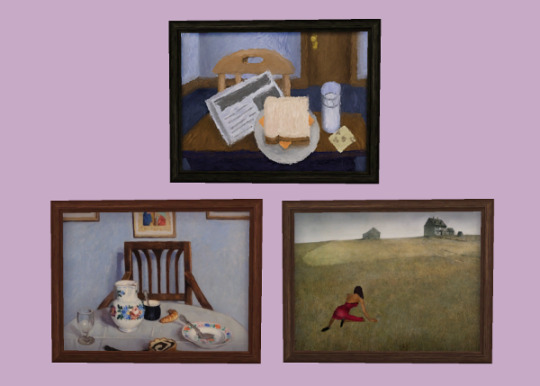
Two recolours +frames for Abstrutionism; "Poppy Cake" by Adolf Fényes (1910), and then this edit of Christina's World by Andrew Wyeth (1948) to include Bella Goth (the original Tumblr poster has deactivated).

A recolour of Anonymous Masterpiece with these two digital paintings by user chestnutroan featuring their farmer Sim and his two alien daughters.
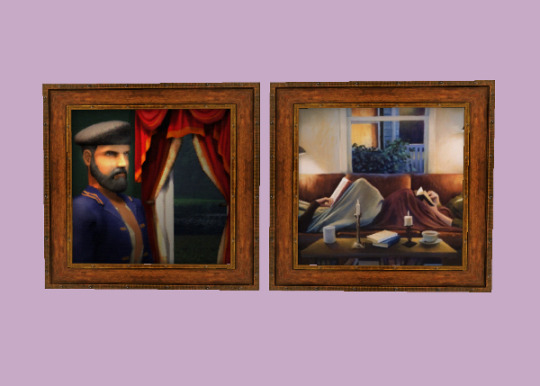
One recolour of the Arghist Soldier with "Friday Nights" by Deborah DeWit (2006), perfect for your novel-enthusiast Sims' reading nook.

One recolour of City Skyline with a fruit & veg painting by Twitter user snail_soup (you can buy a real print of this too if you like it!)

One recolour of the Fourth Element wall scroll with "From Stardust to Stardust - Raccoon" by user ArtOfMienda.

Four Vegetables recoloured with four deliciously juicy tomato paintings by artist Leah Gardner.

Geometry 101 recoloured with a beautiful palette knife painting by Lynn Boggess.

Two recolours of Grilled Cheese (you all know what Grilled Cheese looks like, c'mon); one vintage ad for Hollywood Diet bread which I cleaned/redrew to remove text/graphics, and then "Cloud Rows" by Ivan Eyre (2004).
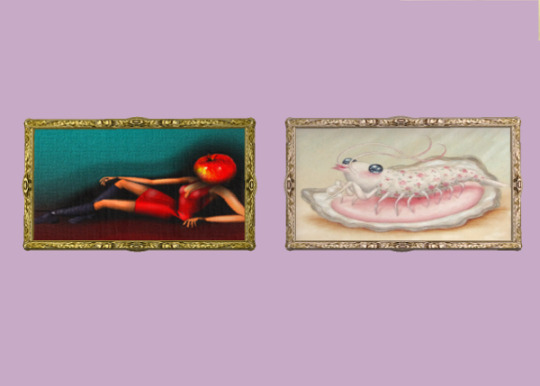
In The Beginning (+frame) recoloured with "Little Thief" by Courtney / Trash Kitty Art (also available as an affordable IRL print).

Kitten vs. Yarn (+frame) recoloured with this goache painting by user ieafy.

"Until Tonight" by Mark Grantham (2019) slapped on Lady On Red.

Two recolours of Living Room; "Midwestern Summer Fun" by user ink-the-artist (you may wanna zoom in for a surprise), then "Girl On A Swing" (2000) by Andrew Macara.

One recolour of Marketing Print with the Beatles as drawn by other Beatles. I don't remember who drew who because I'm actually not much of a Beatles fan but I thought these sketches were really darling.

In Memory of Johnny Gnome (+frame) recoloured with a piece by Emma Roulette.

A recolour of My First Holiday with art from Twitter user heikala_art.
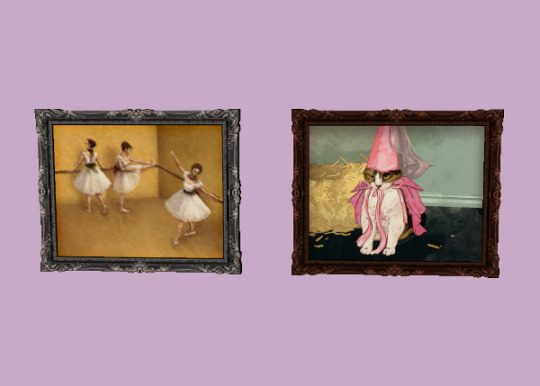
On Pointed Toes (+frame) recoloured with this digital painting by Twitter user catwheezie.
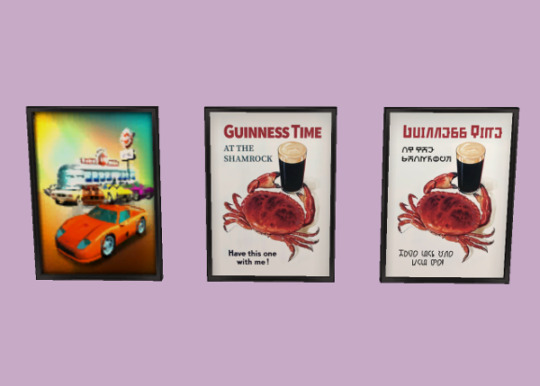
I fell in love with this Guinness ad so I tweaked it from the photo to fit on the Route 66 poster, then made an accompanying Simlish option.

A single Scruffles recolour (+frame) with this adorable cow illustration by Twitter user poodlewool.

Four recolours of the Sim Noir pop art print; three pieces by Al Parker I found through this Tweet (with some English removed) and then an edit of the original painting to look passingly familiar...
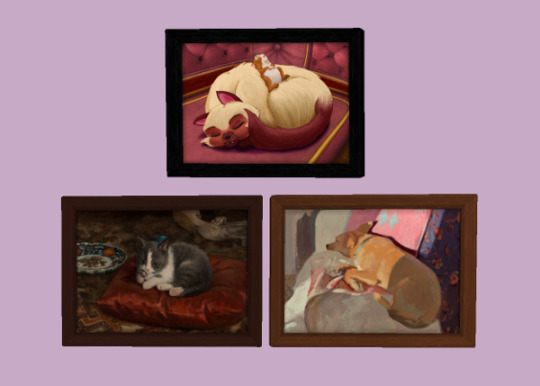
Two recolours (+frames) of Snoozing Enemies; "The Cat on the Pillow" by Adolf von Becker, and "Sleeping Sasha" by Lena Rivo.

Stiller Life (+frame) recoloured with this oil painting of McDonalds by artist Noah Verrier.
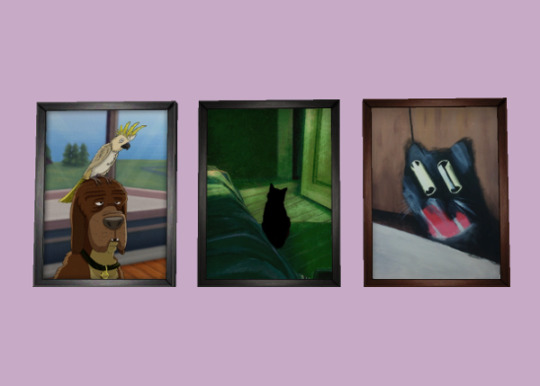
Two recolours (+frames) of Stumped Hound; "Shadow" by Tianyi Zhou and "cat falling off table" by user anasauruss.

The Muse recoloured with this Juxtapoz magazine cover by artist Josh Courlas.

And lastly, three recolours of Untitled (the Bella Goth pop art painting) with works by Hiroshi Nagai.
Download All Paintings @ SFS
374 notes
·
View notes
Text
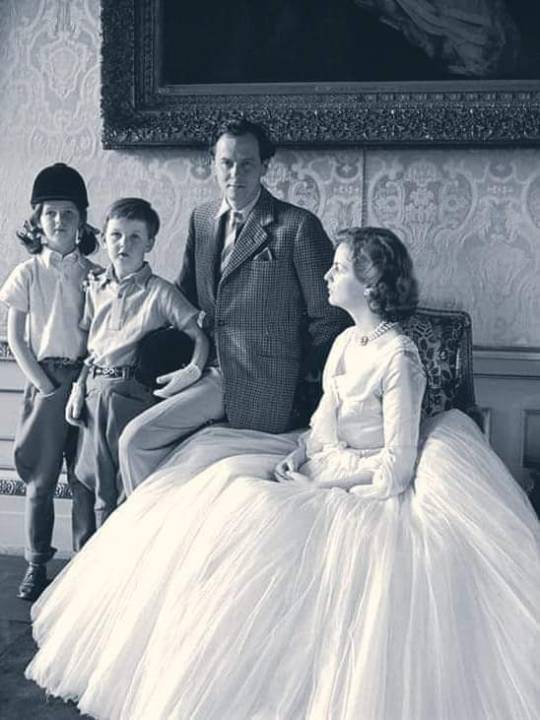
Source: Old History Memories/FB
Deborah Cavendish the Duchess of Devonshire (1920-2014) and her husband Andrew Cavendish, the Duke of Devonshire and their two children; Peregrine and Emma. The family were photographed by Norman Parkinson for Vogue magazine, in August 1952.
Debo as she was affectionately known, was the youngest of seven siblings. She has five sisters Nancy, Pamela, Diana, Unity, Jessica and a brother, Tom. Her death in 2014 as the last of the clan, signalled the end of an era which had spanned 110 years of the Mitford girls capturing society.
Her parents, David, 2nd Baron Redesdale and his wife Sydney were for the best part penniless and eccentric aristocrats. School for the girls was frowned upon, in case they should develop thick calves from playing hockey (Tom, who spent time away studying at Eton, was a Barrister and musician, later killed in Burma in 1945). Amongst other things, linen napkins were abandoned because of the cost of laundering them, and the children were forced to follow a kosher diet on the premises that cancer was less prevalent among Jews. The girls were very hands on and practical at home, developing enquiring minds as they were essentially left to their own devices. This made them ever more appealing when they entered society. Of the sisters, Jessica, Nancy and Deborah became writers.
Their combination of beauty, brains and humour catapulted them to celebrities status and they remained continually courted by the press covering stories of affairs, notoriety and extreme politics.
Diana’s affair with fascist leader Sir Oswald Mosley caused her to leave her marriage to Britain’s wealthiest man at the time, Irish brewing heir, Bryan Guinness. Unity followed her infatuation with Hitler to Germany and died from an attempted suicide. Jessica’s communist support of the Spanish Civil War led her to flee to Spain at age 18, eventually settling in the US. Nancy became a Dior wearing socialist, who left her marriage and moved to France where she indulged in a doomed affair with Charles de Gaulle's right-hand man, Gaston Palewski. Pamela, married the millionaire scientist Derek Jackson and sought of a quieter life out of the limelight. At the time, 15 year-old Debo, who had a crush on Derek, fainted when she heard the news.
Much like the Queen Mother, Debo was looking forward to a life of relative obscurity by marrying the second son of the Duke of Devonshire, Andrew Cavendish in 1941. Unexpectedly, when the 10th Duke died in 1950, they found themselves the 11th Duke and Duchess of Devonshire. Inheriting Chatsworth, Hardwick Hall, Lismore Castle and Bolton Abbey. Death duties meant they donated Hardwick Hall to the nation and precious works of art were sold as Andrew negotiated endlessly, until the debt was finally settled in 1974.
Their lives changed when Billy Hartington, Andrew’s elder brother and heir, was killed during the Second World War by a sniper's bullet in 1944. His death only four months after his marriage to the very popular Kathleen 'Kick' Kennedy, JFK's sister. Four years later, Kick died in a plane crash and is buried in the churchyard at Edensor on the family estate.
Debo redecorated Chatsworth which had previously been leased to a girl’s school, opened it up to the public and spent 54 years of her life there. Her initiatives included the Chatsworth Farmyard – set up to provide people of all ages and backgrounds with the opportunity to learn about farming, food production and traditional landscapes; Chatsworth Farm Shop; and the Orangery gift shop. A pioneer of her time, it paved the way for the commercialisation of other farm estate businesses like Daylesford and Highgrove Farm shops.
Debo moved into Derbyshire vicarage on the death of her husband and assuming the title Dowager Duchess of Devonshire.
Writers of period dramas and historical fiction have looked to the world of the Mitfords sisters for inspiration. Julian Fellowes’ Violet, the Dowager Countess of Grantham in Downton Abbey is said to be based on Nancy’s wicked humour.
Diana was portrayed by Evelyn Waugh in Vile Bodies, Deborah was painted by Lucian Freud and Jessica had a cardboard coffin named after her. John Betjeman - who at one time was in love with Pamela - celebrated the sisters in a verse, the first lines of which read: "The Mitford girls! The Mitford Girls/ I love them for their sins".
Her last publication before her death was her autobiography, ‘Wait For Me!’. See less See less
10 notes
·
View notes
Text
Yes, Daddy by Jonathan Parks-Ramage. Thriller. Struggling writer Jonah Keller is determined to break onto the New York theater scene, and to do that he’s going to need friends in high places. So starts an ambitious plan to seduce renowned playwright Richard Shriver- and it succeeds beyond Jonah’s wildest dreams. Richard is charismatic, passionate, and twice his age- and he introduces Jonah to a world of unfathomable privilege and power. But all fantasies have their dark side, and when Jonah finds himself deeply indebted to Richard, a violent, vengeful spiral begins.
Beware the Woman by Megan Abbott. Thriller. Jacy has never been more in love. Though she’s known Jed for less than a year, they are newly married and expecting a baby, to both of their delight. When Jed proposes a summer vacation at the luxurious lodge of his wealthy father, Jacy eagerly agrees. Dr. Ash is thrilled to meet his new daughter-in-law, and the woods of northern Michigan are full of light and laughter. But soon Jacy’s health begins to suffer, and her husband and father-in-law insist on safeguarding her and her pregnancy. Soon Jacy finds herself in increasingly desperate circumstances, assured that pregnancy hormones are to blame for her growing unease and fear. But can she trust the men in her life? Or is something darker in play?
Cape Fear by John D. MacDonald. Thriller. Fourteen years after his testimony put a violent rapist in prison, attorney Sam Bowden is horrified to discover that Max Cady has been released- and has come to Bowden’s hometown seeking revenge. Though he is unable to prove Cady is committing any new crimes, Bowden and his family gradually sink into terrified paranoia as Cady seems to stalk their every waking hour. And Bowden must question how far he is willing to go- and how much he values the law- in order to protect his wife and children.
Briefly Very Beautiful by Roz Dineen. Dystopian/sci fi. Climate change, viral pandemics, and terrorism have shattered the life that Cass once knew. Her three young children have only ever known uncertainty and erosion, and their father is serving in an endless war overseas. As law and order breaks down and bombings and supply shortages batter London, Cass decides to take the children to her wealthy mother-in-law’s country house. Yet the peace and safety she expects to find there is only temporary, and before long Cass finds herself fleeing again, this time to a commune led by her dangerous, charming brother-in-law.
Faro’s Daughter by Georgette Heyer. Romance/historical fiction. Max Ravenscar is determined to keep his young nephew Adrian from making a perilous mistake- which is to say, marrying Deborah Grantham, who helps her deeply in-debt aunt run a gaming house for reckless gentlemen with money to waste. Convinced Deborah is a ruthless gold-digger, Max attempts to intimidate her into refusing Adrian’s offer- and while Deborah has little interest in the naive, impulsive Adrian, she’ll be damned if she lets his cold-blooded uncle have his way…
Teddy by Emily Dunlay. Historical fiction. Teddy, a pampered Texan socialite, is desperate for a marriage, mostly as a means to escape her suffocating family, whose political ambitions have always outweighed affection and love. She jumps at the chance to wed David Shepard, a humorless, ambitious young diplomatic attache, and move with him to Rome in the summer of 1969. But over-eager, socially awkward Teddy has little in common with the other wives, and soon finds herself in over her head with the roguish American ambassador to Italy. When a scandal unfolds, Teddy is forced to choose between her dignity and her marriage.
The Magic Toyshop by Angela Carter. Magical realism. Melanie blames herself for her parents’ tragic deaths- after all, she destroyed her mother’s wedding dress the night before they died. In the wake of the accident, she and her younger siblings are sent to live with their cruel, eccentric uncle Philip, a talented toymaker and puppeteer who despises children and laughter. But Melanie finds unlikely allies in Philip’s mute wife Margaret and her strange younger brothers, Francie and Finn. As Philip’s tyranny escalates, the household tips towards a violent confrontation, and Melanie must leave her dreamy childhood behind.
The Black Cabinet by Patricia Wentworth. Mystery. Chloe Dane was raised on her family’s idyllic estate, but she was never meant to inherit it. After her parents’ death, she is penniless, working as a seamstress for a local dressmaker. Yet a chance encounter with a cousin she has never met brings her back to Danesborough- now as its new lady. But her late cousin has left behind dark secrets locked inside a mysterious black cabinet, and if Chloe is not careful, those secrets may be the death of her.
Books Recs of 2024
The Tainted Cup by Robert Jackson Bennett. Mystery/fantasy centered around Din, a young assistant investigator assigned to help an eccentric and infamous detective, Ana Dolabra, solve a series of murders. Din is an engraver, his brain altered so he has a photographic memory. However, no one is quite sure how he got his current position, since he failed every single one of his final exams except the combat portion. Ana is an exceedingly odd woman who refuses to go to any crime scene in person and often performs mad science experiments in her spare time. As Din struggles to keep up with the case, which revolves around a bioweapon being unleashed on a series of the empire's best engineers, he also worries what will happen when Ana finally uncovers his secrets.
Highfire by Eoin Colfer. Urban fantasy (very comedic fantasy) about a dragon called Vern (short for Wyvern), who teams up with a juvenile delinquent named Squib (real name Everett Moreau) to take down a corrupt sheriff who is plaguing the Lousiana bayou. Vern is a very small (seven feet long) dragon who is the last of his kind (as far as he knows). When he is spotted by a local troubled teen, his first instinct is to hunt Squib down and kill him, but he quickly realizes the two of them have a common enemy- the murderous sheriff who is running drugs through their territory.
The Last Tale of the Flower Bride by Roshani Chokshi. Magical realism about a romantic-minded art historian who is swept off his feet by a mysterious and charming heiress. After a whirlwind courtship, the happy couple return to her childhood home; a Gothic manor on a lonely island. The more time our narrator spends around his wife's past, the more questions are raised- increasingly sinister ones about who she is and what exactly she is capable of. Once upon a time, she was best friends with an equally odd and dreamy little girl named Indigo. But no one has seen Indigo for many years now- and the Flower Bride may be behind her disappearance.
Chlorine by Jade Song. Horror/magical realism. Since childhood, Ren's entire identity has been wrapped up in swimming. If she can be strong enough, fast enough, special enough, success is sure to come her way. As the end of high school approaches, Ren's passion for swimming becomes less about her future, and more about past legends of mermaids and sirens dragging sailors into the deep. School, friends, and her parents' expectations all fall away- Ren will make her home in the water, no matter what she has to do.
We Are Not Like Them by Christine Pride & Jo Piazza. Realistic fiction. Jen and Riley have been best friends for as long as they can remember, despite their vastly different childhoods. Riley is from a middle class Black family; Jen was raised by an impoverished white single mother. After twenty years of doing almost everything together, their lives are at a crossroads- Riley is a news anchor about to take Philadelphia by storm, while Jen is expecting her first child with her police officer husband. When Jen's husband is involved in the murder of a Black teenage boy by a fellow officer, Riley finds herself expected to cover the story- and Jen finds herself expected to answer for her husband's actions- and her own beliefs about what racism looks like.
Queenpin by Megan Abbott. Crime thriller/noir. Our nameless heroine lives a mousy existence working as a bookkeeper for a rundown local night club, but her life is turned upside down when the infamous Gloria Denton, a gun moll and smuggler, takes her under her wing. Gloria transforms her young protege from a timid girl to a sophisticated, cunning woman capable of handling gangsters, conmen, thieves, and bookies, but when she falls for the wrong man, her relationship with Gloria is strained, and they must decide just how far they can trust one another.
Everyone Knows Your Mother is a Witch by Rivka Galchen. Historical fiction. Based on the real life trial of Katharina Kepler, mother of the famed Johannes Kepler, Imperial Mathematician to the Holy Roman Empire. Katharina is a busybody, a domineering and devilishly clever woman with a particular talent for healing. She is also a fiercely loyal mother to her adult children, but when an old neighborhood grudge flares into accusations of poison and witchcraft, Katharina is determined not to meekly confess and beg pardon. The more she lashes out at her neighbors and the authorities, the more charges begin to pile up against her- despite her son's desperate attempts to save her from torture and execution.
Bury Me Deep by Megan Abbott. Crime thriller/noir. Based on a real life murder case in 1931 Phoenix Arizona. Naive and sheltered Marion Seeley is deposited in Phoenix by her disgraced doctor husband, who is forced to take a job with a mining company in South America after his medical license is revoked. Marion befriends the vivacious Louise and Ginny, two fellow nurses, who introduce her to the underground party scene in Phoenix. Politicians and businessmen flock to the secret parties held by them, and it's a quick way to make money on the side. Drawn in by the luxury and thrills, Marion falls in love with Joe Lanigan, a powerful local politician, but as their affair intensifies, her friendship with the other women fractures, culminating in a gruesome crime.
134 notes
·
View notes
Text
Faro’s Daughter might be the funniest Heyer I’ve read. The heroine straight-up kidnaps the hero in order to strong-arm him into handing over the mortgage on her aunt’s gaming house, but refuses to accept it when he escapes and calmly sends it over??? She wanted it but not like this???
16 notes
·
View notes
Photo


I just read Faro’s Daughter in an irresponsibly short amount of time for someone with the amount of schoolwork I have to do, but I just loved it so much, I had to draw Deb!!! I don’t like the colours of this at all, but I wanted to draw her in the dress from the front cover to make her even a little bit recognisable, even if I strongly disapprove of it. I plan to draw her again in something better (...or maybe worse)
#deb grantham#deborah grantham#faro's daughter#faro's daughter art#georgette heyer#my god did I love this book#the whole thing#so amazing#i want to read it again so much#that Regency Bants#I love them so much as a couple#you know when you're reading a book and you can feel it becoming a favourite#and you know you'll never read it for the first time again#why do the best things never have a fandom?#please good god contact me if you love this book too
25 notes
·
View notes
Photo


REVIEW: Faro’s Daughter by Georgette Heyer
Rating: ★★★★★
Blurb: Deborah Grantham, a gambler's daughter, uses her beauty and cleverness to keep her aunt’s gaming club in business. With the club on the brink of financial ruin, Deb desperately needs to find a way to restore herself and her aunt to respectability. But she detests both her marriage prospects: an old, rich lord whose immoral reputation disgusts her, or the young, puppyish, noble Adrian Mablethorpe.
Max Ravenscar, vastly wealthy, clever, and imperturbable, has no intention of letting his young cousin Adrian squander his prospects by marrying a gambling-club wench. But to Ravenscar's surprise, Deb turns out to be remarkably handsome, witty, and—he can scarcely believe it—well-bred. Disarmed, he expects her to be reasonable and accept the bribe he offers to give up her young suitor.
But Deb is far more stubborn that he anticipated. Though she never intended to marry Adrian in the first place, being bought off is an insult so scathing it leads to a volley of passionate reprisals, escalating between them to a level of flair and fury that can only have one conclusion. Have they finally met their matches?
Review: “Two idiots love fighting each other so much that they might just have to get married about it” continues to be the best genre. People who know what they're talking about would probably say this isn't really like Pride and Prejudice at all, and they're probably be right, but I, a dumbass, will tell you that this has big Pride and Prejudice vibes.
The entire premise of the book is so good. Forget accidental miscommunication for drama, let's all focus on PURPOSEFUL miscommunication for drama in 2020! The fact that Deb is so stubborn that she lets Ravenscar continue believing things she could clear up in two seconds flat just because she hates him that much is just so relatable and lovable, while everyone around her is just going "Deb why. This is literally making your life harder why don't you just clear up the misunderstanding." and Deb's like “RAVENSCAR. MUST. SUFFER.” meanwhile Ravenscar, bless his heart, despite being extremely smart, manages to misunderstand even more things that Deb refuses to clear up. FANTASTIC.
And lest you think Deb is the only stubborn one in this power couple, Ravenscar is straight up so contrary that he yells at a man for trying to help him escape a kidnapping. ALSO FANTASTIC.
In conclusion: historical fiction of straight couples might be valid, actually.
#faro's daughter#georgette heyer#book review#historical fiction#romance#booklr#Abi's Book Reviews#Abi reads Faro’s Daughter
119 notes
·
View notes
Text
There is very little more enjoyable than Deborah Grantham’s escalation.
Ravenscar: I will give you money not to marry my cousin.
Deb: HOW DARE YOU SUGGEST I WOULD MARRY YOUR COUSIN. NO AMOUNT OF MONEY WOULD INDUCE ME TO NOT MARRY YOUR COUSIN. I’M GOING TO MARRY HIM AND RUIN HIM.
Ravenscar: Um, wow. Right, I won’t give you any money, and you won’t marry him, you harpy.
Deb: HOW DARE YOU INSULT ME LIKE THIS. I’LL MAKE YOU PAY.
Ravenscar: ???
Deb: BY BEING EXTRA VULGAR AND EMBARRASSING EVERYONE.
Ravenscar: ?????
Ravenscar: Okay, I will get all those bills from the guy who’s trying to blackmail you into becoming his mistress, and I will blackmail you into releasing my cousin, you cunning, evil lady! You won’t get the better of me!
Deb: OH YEAH LET’S TRY KIDNAPPING.
Ravenscar: ?????????????
Ravenscar: Goddamn I better marry this woman.
#georgette heyer#that escalated quickly#deb grantham raises the stakes faster than anyone#faro's daughter
25 notes
·
View notes
Link
by DaniellaHarwood
Diana accidentally time walks into a moment in Matthew's past, when he was married to a Lady from Grantham. A story told through three perspectives.
Words: 2315, Chapters: 3/3, Language: English
Fandoms: A Discovery of Witches (TV), Downton Abbey, All Souls Trilogy - Deborah Harkness
Rating: General Audiences
Warnings: No Archive Warnings Apply
Categories: F/M
Characters: Diana Bishop, Matthew Clairmont, Mary Crawley, Henry Talbot
Relationships: Diana Bishop/Matthew Clairmont, Mary Crawley/Henry Talbot
2 notes
·
View notes
Text
Cards on the Table (pt. 2)
A series of post-canon vignettes, each from a different character's point of view. [Part 2/2]
A Faro’s Daughter one-shot collection. Deborah Grantham/Max Ravenscar, with a side of Phoebe Laxton/Adrian Mablethorpe.
[go back to part 1]
6. Lady Mablethorpe
Augusta Laxton surely was the most insufferable woman on earth, Lady Mablethorpe decided as her son finally bundled his affronted mother-in-law into her carriage. Not that she blamed Phoebe, of course – with a mother like that, anyone would sooner take to their bed than receive any visitors, and there was the poor girl’s condition to be considered. If there was one thing Lady Mablethorpe was not willing to tolerate, it was risking the health of her future grandchild – and prospective heir to Mablethorpe, as she cherished the hope – for the sake of such a selfish creature’s greediness and insensitivity.
“I thought she would never leave,” murmured Arabella at her side, heaving a not-precisely-ladylike sigh of relief. As she couldn’t help but agree on the sentiment, if not her niece’s manners, Lady Mablethorpe simply nodded her assent, and turned her attention to her cup of tea.
“I for one am glad to see Adrian standing up for his wife,” Deborah Ravenscar declared, not unreasonably, and if her ladyship hadn’t heard it with her own ears, she would have called anyone a fool who dared to suggest that her nephew was in fact capable of anything as undignified as a snigger. Marriage was doing Max a world of good, she had to admit, and for all that she still congratulated herself on being spared such a dubious connection, she privately had to acknowledge that, gaming house or not, Lady Bellingham’s niece displayed more respectability and sense than many a duke’s daughter.
“I’m terribly sorry you had to bear witness to such a scene,” Adrian apologised presently, and all but collapsed into the nearest chair. “Lady Laxton is – well, you’ve seen. Truth be told, we’re planning to remove to Mablethorpe as soon as Phoebe is well enough to face the trip.”
“I agree that is probably the wisest course of action,” Max considered thoughtfully, relieving his wife of her empty teacup. The new Mrs Ravenscar offered him a quick, warm smile for his troubles, and let him fuss with her shawl with a look of barely concealed amusement.
“Adrian, dear, do you think Phoebe would be willing to receive me, if only for a few moments? I would very much like to offer her my congratulations in person.”
“Oh, I’m sure she won’t mind seeing you, Deb,” was the prompt reply. “She’s ever so fond of you, and with good reason, as you well know.”
If her ladyship had to suppress a wince at this overly familiar form of address between the pair, she was too well-bred to let it show. And as her nephew appeared more than willing to tolerate such liberties from both parties, it was hardly her place to intervene.
“Give our cousin my love,” Arabella prompted sweetly, even as Max stood offering his arm and escorted his wife out of the room in a most attentive manner. Well, this is beyond everything, she thought to herself, and it took her a full minute to finally register the peculiar way her niece-in-law’s dress – sporting a much more conservative cut than she was normally wont to wear – hugged her figure.
“Max, you impossible creature!” she gasped as her nephew resumed his previous place on the settee. “Are you to tell us we ought to congratulate you as well?”
Had the sudden smile gracing his customarily severe countenance not been indication enough, the air of contrived innocence assumed by her niece would have been her answer. It was plain that Arabella was in on her brother’s secret, just as Adrian had been kept in the dark until that very moment.
“You mean – oh Max, and you never said anything! When are we to expect...?”
“Late summer, we believe.”
As her ladyship’s grandchild wasn’t due until early autumn, she was forced to hold back an irrational twinge of resentment – which promptly turned into a gleam of excitement as the full possibilities started to dawn upon her. So absorbed was she in the contemplation of a much desirable closer alliance between their two families that she all but missed her son’s heartfelt congratulations, and was only brought back to the present day by the sardonic look in her nephew’s eye.
“I fear it is incumbent upon me to warn you, ma’am, that I am determined to see any son or daughter of mine married out of choice rather than duty, or any relation’s wishes.”
“Don’t be absurd, Max,” she chided him, deeply irritated that her secret hopes should be so openly addressed, and just as callously dismissed.
“No child of mine will be induced into matrimony by anything but the deepest of loves,” Adrian declared with an air of affronted dignity, eliciting a startled giggle from his young cousin – who was well enough informed of the circumstances accompanying the sudden transferral of his affections from one lady to another, her aunt reflected gloomily.
Still, Lady Mablethorpe consoled herself reflecting that nothing prevented one of her future grandchildren from falling in love with one among her nephew’s offspring, and she would be there to help things along if she had any say in the matter.
7. Christopher Grantham
“Mr Grantham, what a pleasant surprise! Have you come to visit your sister?”
The gentleman in question shut his eyes briefly, and valiantly set out to ignore the small pang of longing in his chest. Arabella Ravenscar was as lovely a vision as ever in her walking dress and bonnet, and he was faced with the sudden impulse to run up the stairs and gather her in his arms. Only the painful memories of the lady’s inconstancy in her affections stopped him from acting on such an impulse, and he remembered himself in time to bow deeply as she passed him by.
“Indeed I am, Miss Ravenscar,” he replied politely, quickly averting his gaze. “Permit me to wish you a very good day.”
When he was finally admitted to his sister’s presence, Kit Grantham was still so preoccupied with his own thoughts that he didn’t immediately notice the hustle and bustle of servants, as if they were in the middle of packing their mistress’ belongings for an imminent journey.
“Are you going out of town?” he ventured to enquire at length, and was met with a tinkle of laughter from his dearest sister.
“I’m sure I explained it all to you in my last letter, Kit,” she shook her head, apparently amused. “Max and I agreed that Chamfreys would be a great deal more comfortable for my confinement.”
That finally prompted his gaze to drop to her stomach, and he couldn’t refrain from widening his eyes at the sight he was met with. His sister was – huge, there were no two ways about it, and for the first time in his life he actually stopped to consider such an uncomfortable topic as childbearing, and how it might affect any and all females of his acquaintance.
“And are you – I mean to say, is everything – oh, don’t make me say it, Deb, I beg of you.”
His sister took pity on him, and offered him a sympathetic smile. “We are both as well as can be expected, and I’m positive your nephew or niece is eager to meet you, when the time comes.”
“I’m sure I have no idea how ladies are so willing to put themselves through any of this,” he blurted out, immediately blushing at his own forwardness. “Oh, forget I said anything, I’m all out of sorts this morning.”
Deb considered him for a long moment. “Did you by any chance happen to run into my dear sister as she was preparing to go out for her walk in the park?”
He let out a rueful sigh, twisting his gloves in his hands. “I was so sure of her, Deb, I still cannot conceive how she had it in herself to deceive me so.”
“Oh, Kit, I know for a fact she didn’t mean to, but she’s so very young, and more than a little spoilt besides. I hope with time to have more of a good influence on her, and I’m so very sorry you had to suffer because of this – but let me be blunt and assure you that the two of you would not have suited in the slightest, and it is much wiser to take the time to get better acquainted with your prospective partner for life before setting your heart irrevocably on them.”
Kit Grantham turned a mildly reproachful gaze on his elder sister. “Deb, by your own admission you and Ravenscar had only been acquainted for two weeks before he proposed, and you weren’t even in town for one of those same weeks.”
Deborah laughed. “That’s true, but I would hardly call ours an ordinary courtship, and you said yourself that we must have been both out of our senses to even consider marriage after I had him locked in our cellar.”
“Utterly and completely mad,” he nodded with conviction, though deep down he was quite in awe of how noticeably happy his sister had been since becoming Mrs Ravenscar. Perhaps there was still hope for him after his disappointment, after all.
Once he’d kissed his sister goodbye and presented her with his most sincere wishes for a smooth confinement, he left the house in Grosvenor Square with a spring in his step, and the first glimmer of hope that he might, one day, procure the same kind of happiness for himself.
8. Miss Ravenscar
“Arabella, my dear, how can you forget your manners so?” her mother complained weakly after her as she rushed up the stairs, and all but barged into her brother’s study unannounced.
“Good day to you, Belle,” Max greeted her with intolerable composure, gathering the documents spread in front of him into a neat pile. “I trust you had a pleasant journey?”
“Max, how could you be so unbearably reticent in that note of yours? You must tell me everything, at once!”
“Why, I thought I had been perfectly clear,” he demurred, yet she could clearly see the corners of his lips trembling into the beginnings of a smile. “Both mother and child are perfectly well, and they are currently resting – or at least, they were doing so when I left them, not half an hour ago.”
“Max!” she glared at him in frustration. “Am I the aunt to a little boy, or a girl?”
“Always so impatient,” he shook his head, and stood up. “You are aware, I’m sure, that the proper thing for us to do is to go downstairs, and share the announcement with your affectionate mother.”
“You know very well you don’t care a fig for propriety, and as for Mama, I’m positive she will survive. It’s not as if she’s the child’s grandmother – not really, anyway.”
“And thank heavens for that,” she heard him murmur under his breath, and gave him a hard pinch in retaliation. “Now, if you think you can behave yourself for longer than two minutes at a time, it would be my pleasure to introduce you to the new addition to our family party.”
Mollified by the prospect, she slipped her hand into the crook of his arm, and offered him a most demure smile. “I will be on my best behaviour, I promise.”
In short order, she was introduced into her sister-in-law’s bedchamber, greeted her with a kiss on her exceptionally pale cheek, and couldn’t refrain from taking hold of both of her hands and questioning her at length about her ordeal.
“Do not fret yourself so, my dear,” Deborah reassured her warmly, patting her on the arm. “It is not so very bad, and you will see for yourself how the blessing that comes of is well worth the pain.”
Arabella cast an extremely dubious glance at her pallid complexion and the look of utter exhaustion about her countenance. Still, Deborah’s eyes were sparkling with barely restrained joy, and she could hardly miss the brightness of her smile when the nurse strode in with her charge in her arms.
“My dearest sister, I would like you to meet your new nephew, Adrian,” Max announced, with no small amount of pride in his voice. Her breath caught in her throat as she took in the delicate features of the sleeping infant’s face, his miniature hands curled in small fists around a corner of his blanket.
“He’s so tiny,” she breathed out in wonderment, extending a finger to trace the contours of one diminutive fist. “Did you say his name is – Adrian? Does our cousin know?”
“Not at present, though it will be our pleasure to inform him as soon as he visits, like he promised,” her brother smiled, his eyes searching for Deborah’s. “He is after all the reason why we met in the first place, and I cannot think of a better way to honour his – most unwitting – role in bringing us together.”
“Oh, but you must prepare yourselves, Mama will be most disappointed that you didn’t choose our late father’s name for the child,” Arabella said ruefully. “I wish I could talk her out of it, I really do, but you know her, Max.”
“I do,” Max nodded with a great deal of forbearance, and took hold of his infant son with such an air of practiced ease that had his sister most surprised. “Now, we shall go downstairs and introduce the little one to Olivia, thus sparing my darling wife the trial of being faced with my stepmother’s complaints until she’s well on her way to recovery.”
“That’s most considerate of you, dear husband,” Deborah laughed, her gaze lingering on the child with such undisguised tenderness that Arabella found herself wondering what it would be like, one day, to hold her own son or daughter in her arms.
9. Phoebe Mablethorpe (née Laxton)
Young Lady Mablethorpe quietly studied her husband as he leaned over the bassinet with an expression of pure rapture on his handsome face. He looked ever so pleased with their newborn daughter, and yet, she couldn’t seem to put her mother’s rather uncomplimentary speech out of her mind.
“Oh, Adrian,” she whispered timidly, walking up to his side. “I’m sorry I couldn’t do my duty and provide you with an heir. I promise it will be a son next time.”
The sudden, horrified look on her husband’s face gave her pause, and she didn’t even think to resist when he gathered her in his arms quite abruptly.
“Phoebe, how can you speak so! I find I have no words to express how much I love our little Deb, and I wouldn’t want to trade her for anything in the world, do you hear me?”
“I do,” she nodded meekly, hiding her face into his waistcoat. “It’s just, Mama says that – ”
His arms tightened around her, and she felt him press a fierce kiss on top of her head. “Dearest, I hate to speak ill of your mother, you know I do, but the truth is, you ought not listen to a word she says when it comes to such matters.”
“I’m sorry,” she apologised at once, nestling further into his embrace. “And I do love our daughter so, I hate to think she will be looked down by our families until I can bear you a son.”
Adrian chuckled, and placed a gentle finger under her chin. “Well, my mother for one is positively delighted with her granddaughter, if only because she’s already forming some serious designs for her to marry into the Ravenscar fortune. And you know how pleased our cousins are that we named her after Deborah.”
“I will never allow my daughter to be forced into matrimony against her will,” Phoebe declared with unshakable conviction, all but suppressing a shudder at the horrific memories of her parents explaining in no uncertain terms how it was her precise duty to accept, and even encourage, Sir James Filey’s suit. “Oh, Adrian, I don’t know what would have become of me, if you and Deborah hadn’t come to my rescue at Vauxhall Gardens.”
Her husband kissed her very tenderly, his fingers coming to rest at her cheek. “You don’t need to worry about that anymore. And I thank my lucky star that I found the most delightful companion for my life that night.”
Her heart swelling with joy, she found she had no room left to tie herself in knots over the past. And if their daughter chose to break the moment by making her presence known quite forcefully, that was surely her prerogative; as a new mother, she found she could hardly begrudge her child anything, let alone this.
10. Lucius Kennet
Strolling into the house in Berkley Square after an urgent summoning from Lady Bellingham, Mr Kennet was more than a little surprised to be welcomed by her ladyship rather than one of the servants.
“Oh, thank God you’re here, Lucius,” Lady Bellingham proclaimed in a most agitated manner, clutching at her vinaigrette. “My poor nerves are in such a state, I swear I don’t know what to do with myself. Oh, to think that I should live to see the day – but I daresay I won’t, I can feel my spasms coming already.”
“Calm yourself, ma’am,” he urged her, not particularly moved by such a declaration. “And start from the beginning, if you please.”
“Foolish, headstrong girl! She says she shall never see him again, and he’s such a proud creature he will undoubtedly divorce her – we shall all be ruined, and there’s that poor child to be considered, it doesn’t even bear thinking!”
“I’m willing to bet any sum of your choosing that it won’t come to that, ma’am,” he replied with a considerable deal of amusement, earning a reproachful look from the respectable matron.
“I wish you would take this seriously, Lucius. You know very well how Deb is – she refuses to be reasoned with, and now she’s locked herself in one of the rooms upstairs, and she declares she won’t leave even if her husband comes here on his knees all the way from Grosvenor Square and begs for her forgiveness.”
Mr Kennet looked out of the window just in time to spot a carriage bearing the Ravenscar crest stopping in front of the house, and grinned in anticipation of a most diverting scene. “As to that, we shall have to wait and see,” he winked at her ladyship, and went to answer the door himself.
Ravenscar looked momentarily startled at his presence, but was quick to regain his composure, and barely deigned him with a contemptuous glance as he pushed past him and went straight for Lady Bellingham.
“I need to see my wife most urgently, ma’am,” the man gritted out between his teeth, his hat half crushed in his grip. “I beg you to give me leave to seek her out for myself.”
“And what makes you believe she’s here, hmm?” Lucius drawled from the entrance, his arms crossed in open defiance of Ravenscar’s wishes. If he knew his gentleman, he had more than half an idea of where all this was going, and he was determined to have his fun in the meantime.
“I would advise you to stay out of this, Kennet, or I won’t be held responsible for my actions.”
“Gentlemen, if you please,” cried out Lady Bellingham, reaching with trembling fingers for her smelling salts. “My niece is indeed upstairs, Sir, and I would lead you to her myself if I thought that would answer. I’m afraid nothing will serve while she’s in one of her tantrums, and I do declare she will be the death of me one day, but what can one do?”
As her ladyship looked perilously close to drop in a dead faint, Mr Kennet stepped forward to help her to the nearest chaise. The two gentlemen exchanged a tense look across the room, until Lucius eventually relented and nodded in the direction of the stairs.
“I’ll take care of the lady, you go upstairs and set our darling Deb to rights,” he smirked, feeling quite sure that, had Ravenscar not had way more pressing matters to attend, he would have happily knocked half the teeth out of his mouth.
It was nigh on half an hour later when Lady Bellingham came back fully to her senses, helped along by a glass of good Burgundy, and promptly resumed her gloomy predictions about the future.
“Think of the scandal, Lucius! I dismissed the servants as soon as I figured what Deb was up to, but I fear by then it was too late. And it can’t be helped anyway, if they’re set to have a breach, which looks more and more inevitable, and – oh, Lucius, they’re fully capable of murdering one another when they’re both in a rage, and where will that leave us?”
“If you have a little more patience, ma’am, you will see for yourself how everything will turn out for the best,” he hastened to reassure her, and indeed, he was soon proven right by the abrupt reappearance of Mr and Mrs Ravenscar, both of them looking oddly flushed, and more than a little sheepish besides.
“Not one word,” Deborah warned him as he took in their rumpled appearances, from his hastily rearranged cravat to the way her curls tumbled freely around her shoulders.
“Wouldn’t dream of it,” he grinned, and poured himself a glass of wine. “I shall drink to your future happiness, my darling.”
Deborah blushed most endearingly, and turned her attention to the afflicted matron. “Dearest Aunt Lizzie, we’re very sorry for causing you such an unreasonable amount of trouble. With your permission, we shall be on our way presently.”
“Oh, go away, you impossible creature,” her aunt waved her off feebly. “Both of you.”
Ravenscar looked as embarrassed as he ever was, which was in itself most diverting. “My apologies, ma’am,” he bowed, somewhat uncomfortably, and offered his arm to his wife.
“Faith, if young Master Adrian doesn’t get a new playfellow within the next twelvemonth, then I’m not Lucius Kennet,” he laughed under his breath, and tossed off his wine.
#Faro's Daughter#Georgette Heyer#Selina Mablethorpe#Kit Grantham#Arabella Ravenscar#Phoebe Laxton#Lucius Kennet#Deborah/Max#Phoebe/Adrian#one shot collection#post-canon#family#married life#I wrote a thing#Cards on the Table (Faro's Daughter)
3 notes
·
View notes
Text
Pupils learn about the power of advertising with help from E.ON has been published on Energy Solutions News
New Post has been published on http://www.energybrokers.co.uk/news/eon-energy/pupils-learn-about-the-power-of-advertising-with-help-from-e-on
Pupils learn about the power of advertising with help from E.ON
Pupils from ten schools across the UK have had the opportunity to learn about how to create a fun and engaging advert as part of a workshop organised by E.ON.
The pupils, aged 9-11 spent the workshop learning all about what makes a successful television advert and understanding how to produce a unique advert, before being given the chance to write and record their very own energy-related advert using specialist filming equipment to enter into E.ON’s nationwide ‘Get Smart’ competition.
During the workshop the youngsters were encouraged to think about the topic of energy and how new technology such as smart meters can bring benefits to consumers and help them use less energy and save money on their energy bills.
The workshops have been organised as part of E.ON’s nationwide ‘Get Smart!’ competition, launched in conjunction with Collaborate Digital.
The nationwide competition encourages primary and secondary school pupils to think about smart meters in a fun and engaging way by asking them to write, produce and record a 60-second film all about the new technology.
The winning entries will feature on E.ON's social media channels, including Facebook and YouTube, and may be used as part of E.ON’s future communications activities around smart metering.
Billie-Jean Poole, Senior Community Relations Executive at E.ON, said: “Our workshops offer an exciting, unique experience for pupils to really understand how to create a winning film by learning from people who have experience of working in the industry, whilst at the same time developing an understanding of key energy topics.
“Through our media workshops we hope to inspire pupils about STEM subjects and hope that by taking part in the fun and exciting sessions, they’ll learn about how important these subjects could be to their future career prospects.”
Deborah Bunn, Head Teacher at Walkeringham Primary School, one of the schools taking part in the workshop, said: “The pupils thoroughly enjoyed taking part in the workshop and there was a real buzz of excitement in the classroom during the session.
“Not only did the pupils learn all about creating a winning television advert, they came away with an understanding of energy and how smart meter technology plays a key role in the future of our energy needs.”
Mark Matthews, Director at Collaborate Digital, said: “It’s been great working with E.ON to deliver these workshops in the schools and to engage the primary school pupils with the subject of energy in a fun, hands-on way.
“The pupils really enjoyed creating their own unique film about the smart meters and the benefits they bring and then being able to actually use the filming equipment to bring their scripts to life was a great experience for them.
“I’m very much looking forward to seeing the final films and other entries as part of the competition.”
Pupils can either enter the competition themselves or teachers can enter on behalf of their school as follows:
Individual entries: Pupils and parents should visit collaboratedigital.com to register to enter the competition. Once registered they will gain access to all the relevant resources and information, including a full brief, terms and conditions and guidance of how to enter.
School entries: Interested teachers should visit collaboratedigital.com to register or call 0151 924 1189 for more information and for full Terms and Conditions.
The films can be recorded using any mobile device, a tablet or a computer and should be submitted at collaboratedigital.com.
The competition is free to enter and the closing date for entries is 5pm on Tuesday 12th December 2017.
E.ON has created some helpful videos to provide further information about the competition and how to enter. Click here for Key Stage 2 (7-11 years) and here for Key Stage 3 (11-14 years).
‘Get Smart!’ forms part of E.ON’s broader activities aimed at inspiring young people to get involved in STEM and to consider STEM subjects as possible career options. E.ON offers a range of educational workshops through its Energise Anything programme, which also includes online parent and classroom based activities. The activities support the national curriculum and have been designed to help pupils aged 5-16 understand all stages of energy production, distribution and consumption. Full details and resources can be found at eon-uk.com/energiseanything.
E.ON was one of the first suppliers to start installing smart meters for its customers and so far has installed around a million smart meters in customers’ properties. For more information on E.ON’s smart meter installation programme please visit the website at eonenergy.com/smart.
Ends
Notes to editor
Schools who took part in the workshops are:
Clarborough Primary School in Retford, Walkeringham Primary School in Doncaster, Richard Bonnington Primary School in Arnold, Killisick Primary School in Arnold, Shirestone Primary School in Birmingham, Our Lady's Catholic Primary School in Birmingham, Ark Tindal Primary School in Birmingham, St Mary's C of E Primary School in Wigston, St Michael & All Angels Church of England Primary School in Brookside Rearsby and Buckminster Primary in Grantham.
For more information contact:
Naomi Troy, 02476 180523, [email protected]
Jane Branscombe, 02476 183681, [email protected]
0 notes
Photo

Ship aesthetics: Max Ravenscar/Deborah Grantham.
Edited with PhotoScape.
#Faro's Daughter#Georgette Heyer#Max Ravenscar#Deborah Grantham#Deborah/Max#ship aesthetics#I did a thing
15 notes
·
View notes